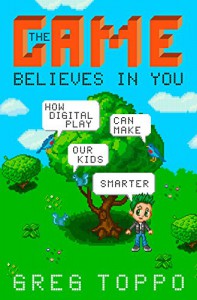The Game Believes In You: How Digital Play Can Make Our Kids Smarter


This, this was amazing. People are doing amazing things out there and why haven't I heard about most of this before?! I've never been a fan of do your work and we'll let you play a game (though no I know why psychologically that's a bad idea), but I've long maintained that you can learn a lot from good media. I've told so many people about my AP US History class where the teacher taught us what she wanted to and not the areas she'd been told would be heavily covered on the test. (head in hands *sigh*) Anything after WWII she just handed us a packet and basically said "good luck." Guess which time period I knew the least about. I passed the test with a 3 (out of a possible 5). I should have gotten higher as I got a 4 on AP Biology that I took the same semester. But one teacher taught was they should and the other... The reason I could answer a good third of those questions was from historical fiction and non I'd read and one, an art exhibit I'd happened to go to a month before. If I'd not read, watched documentaries, etc., I'd never have passed. And I planned to study history in college!
When you consider Assassin's Creed games which bring historical places, events, and people to life as well as Rome Total War and others, it's not hard to imagine there are thing games can teach us. But this book isn't really talking about those. Toppo doesn't look at games that reward a lesson but are the lesson. He looks at teaching structured like a game. He looks at how game theory (which we know works to keep people playing, teaching increasingly harder concepts, etc.) has and can be applied to school. And he looks at how games have shown to help students and adults with ADHD, depression, and more.
There are so many interesting ideas, I'd have to write forever to cover them all. A game that recreates Thoreau's world around Walden Pond. A game that lets you do what its name says, Throw Trucks With Your Mind.(And can I just say I need this game sooo badly!) Teachers using Second Life and WOW to help bring classes together and teach them life lessons.
One of the best parts was the fact the author doesn't suggest children should only play games or that games are the savior of education. Far from it. Rather that what students know and understand can be made a part of school and that maybe education can learn something from video game creators and vice versa. Some already have.
If you are interested in education, video games, psychology, etc., I'd say give this book a look! I know it's made me rethink both my schooling and why video games work/don't work for me.
Links to my reading progress updates and quotes from the book:
 8
8
 2
2












